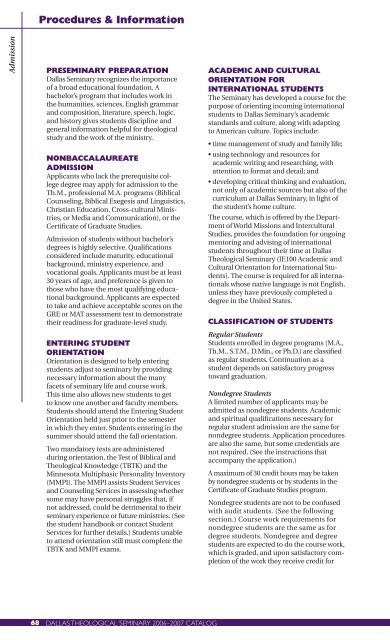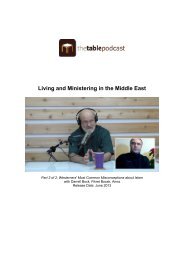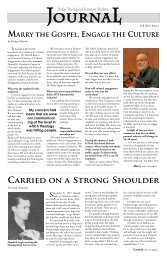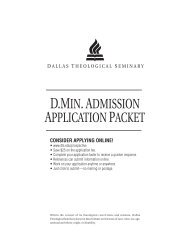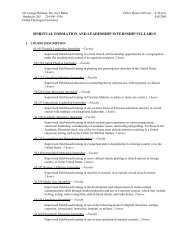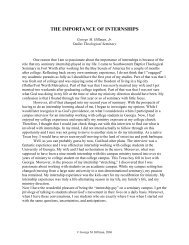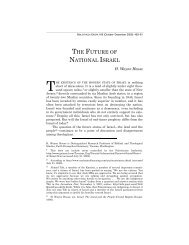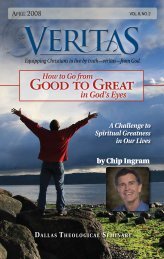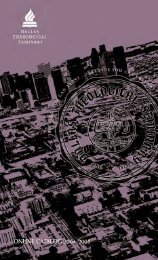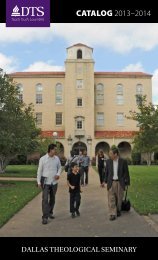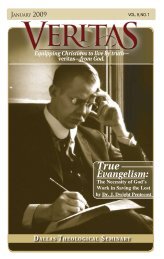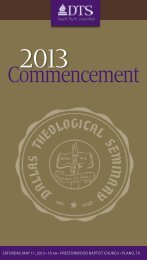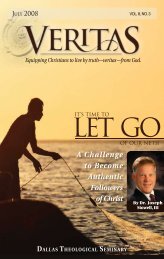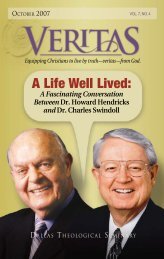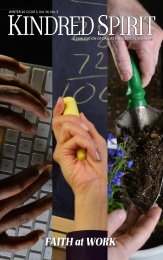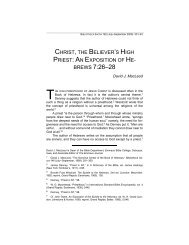Academic Programs - Dallas Theological Seminary
Academic Programs - Dallas Theological Seminary
Academic Programs - Dallas Theological Seminary
You also want an ePaper? Increase the reach of your titles
YUMPU automatically turns print PDFs into web optimized ePapers that Google loves.
Procedures & Information<br />
Admission<br />
PRESEMINARY PREPARATION<br />
<strong>Dallas</strong> <strong>Seminary</strong> recognizes the importance<br />
of a broad educational foundation. A<br />
bachelor’s program that includes work in<br />
the humanities, sciences, English grammar<br />
and composition, literature, speech, logic,<br />
and history gives students discipline and<br />
general information helpful for theological<br />
study and the work of the ministry.<br />
NONBACCALAUREATE<br />
ADMISSION<br />
Applicants who lack the prerequisite college<br />
degree may apply for admission to the<br />
Th.M., professional M.A. programs (Biblical<br />
Counseling, Biblical Exegesis and Linguistics,<br />
Christian Education, Cross-cultural Ministries,<br />
or Media and Communication), or the<br />
Certificate of Graduate Studies.<br />
Admission of students without bachelor’s<br />
degrees is highly selective. Qualifications<br />
considered include maturity, educational<br />
background, ministry experience, and<br />
vocational goals. Applicants must be at least<br />
30 years of age, and preference is given to<br />
those who have the most qualifying educational<br />
background. Applicants are expected<br />
to take and achieve acceptable scores on the<br />
GRE or MAT assessment test to demonstrate<br />
their readiness for graduate-level study.<br />
ENTERING STUDENT<br />
ORIENTATION<br />
Orientation is designed to help entering<br />
students adjust to seminary by providing<br />
necessary information about the many<br />
facets of seminary life and course work.<br />
This time also allows new students to get<br />
to know one another and faculty members.<br />
Students should attend the Entering Student<br />
Orientation held just prior to the semester<br />
in which they enter. Students entering in the<br />
summer should attend the fall orientation.<br />
Two mandatory tests are administered<br />
during orientation, the Test of Biblical and<br />
<strong>Theological</strong> Knowledge (TBTK) and the<br />
Minnesota Multiphasic Personality Inventory<br />
(MMPI). The MMPI assists Student Services<br />
and Counseling Services in assessing whether<br />
some may have personal struggles that, if<br />
not addressed, could be detrimental to their<br />
seminary experience or future ministries. (See<br />
the student handbook or contact Student<br />
Services for further details.) Students unable<br />
to attend orientation still must complete the<br />
TBTK and MMPI exams.<br />
ACADEMIC AND CULTURAL<br />
ORIENTATION FOR<br />
INTERNATIONAL STUDENTS<br />
The <strong>Seminary</strong> has developed a course for the<br />
purpose of orienting incoming international<br />
students to <strong>Dallas</strong> <strong>Seminary</strong>’s academic<br />
standards and culture, along with adapting<br />
to American culture. Topics include:<br />
• time management of study and family life;<br />
• using technology and resources for<br />
academic writing and researching, with<br />
attention to format and detail; and<br />
• developing critical thinking and evaluation,<br />
not only of academic sources but also of the<br />
curriculum at <strong>Dallas</strong> <strong>Seminary</strong>, in light of<br />
the student’s home culture.<br />
The course, which is offered by the Department<br />
of World Missions and Intercultural<br />
Studies, provides the foundation for ongoing<br />
mentoring and advising of international<br />
students throughout their time at <strong>Dallas</strong><br />
<strong>Theological</strong> <strong>Seminary</strong> (IE100 <strong>Academic</strong> and<br />
Cultural Orientation for International Students).<br />
The course is required for all internationals<br />
whose native language is not English,<br />
unless they have previously completed a<br />
degree in the United States.<br />
CLASSIFICATION OF STUDENTS<br />
Regular Students<br />
Students enrolled in degree programs (M.A.,<br />
Th.M., S.T.M., D.Min., or Ph.D.) are classified<br />
as regular students. Continuation as a<br />
student depends on satisfactory progress<br />
toward graduation.<br />
Nondegree Students<br />
A limited number of applicants may be<br />
admitted as nondegree students. <strong>Academic</strong><br />
and spiritual qualifications necessary for<br />
regular student admission are the same for<br />
nondegree students. Application procedures<br />
are also the same, but some credentials are<br />
not required. (See the instructions that<br />
accompany the application.)<br />
A maximum of 30 credit hours may be taken<br />
by nondegree students or by students in the<br />
Certificate of Graduate Studies program.<br />
Nondegree students are not to be confused<br />
with audit students. (See the following<br />
section.) Course work requirements for<br />
nondegree students are the same as for<br />
degree students. Nondegree and degree<br />
students are expected to do the course work,<br />
which is graded, and upon satisfactory completion<br />
of the work they receive credit for<br />
68<br />
DALLAS THEOLOGICAL SEMINARY 2006–2007 CATALOG


